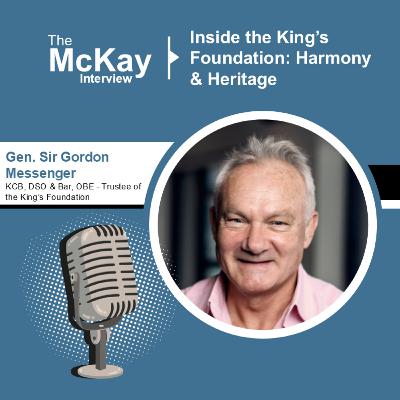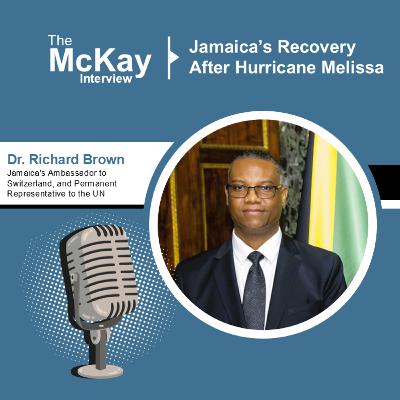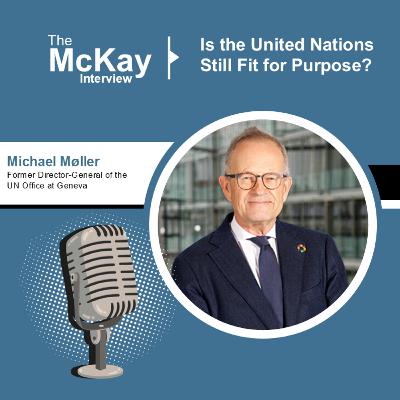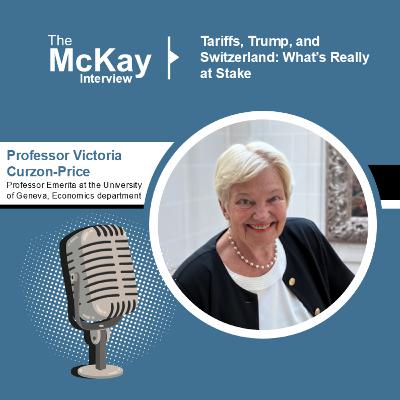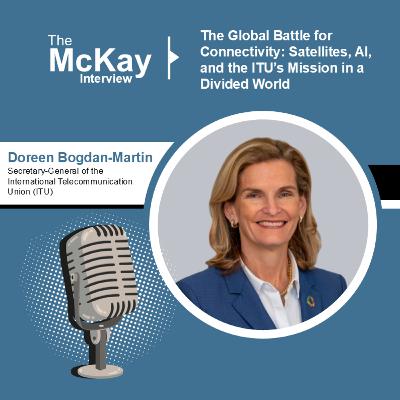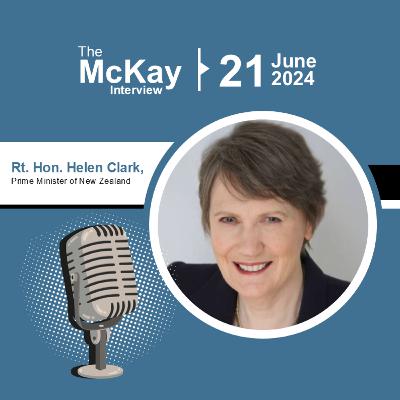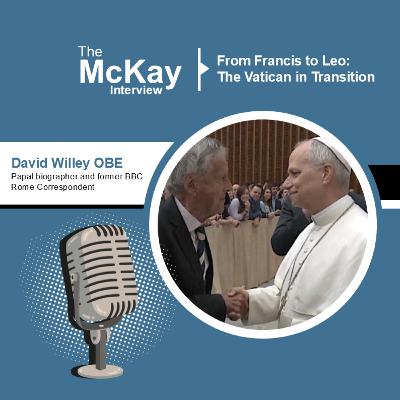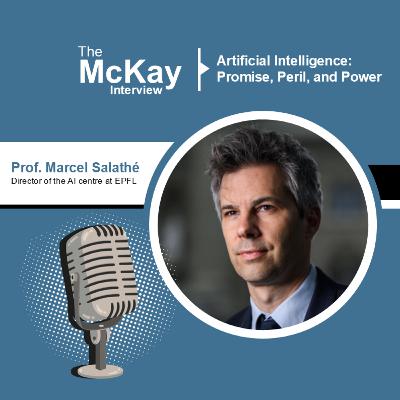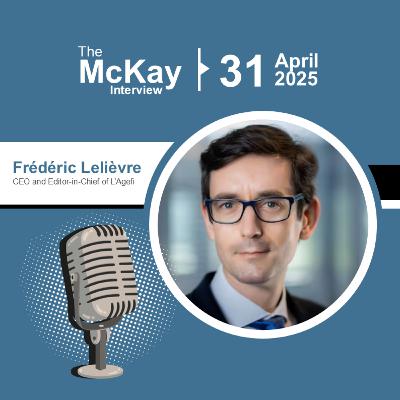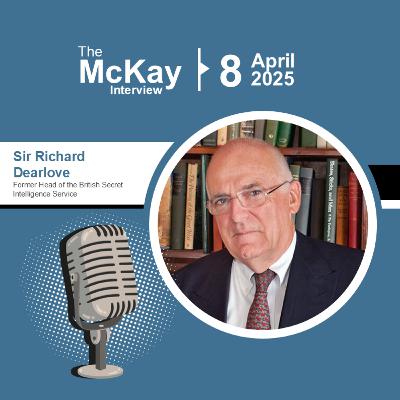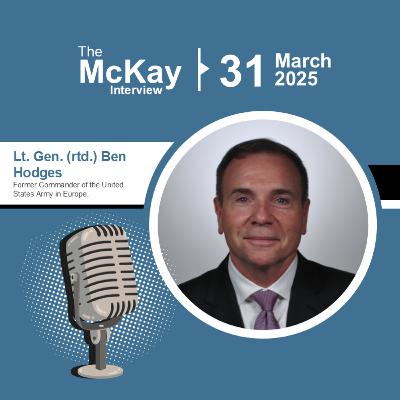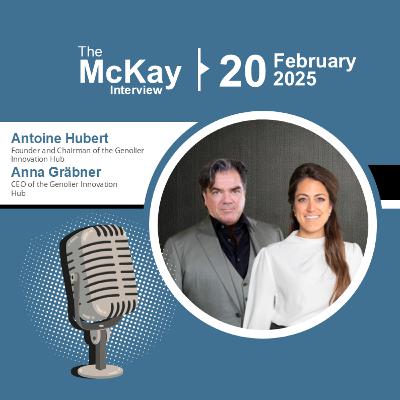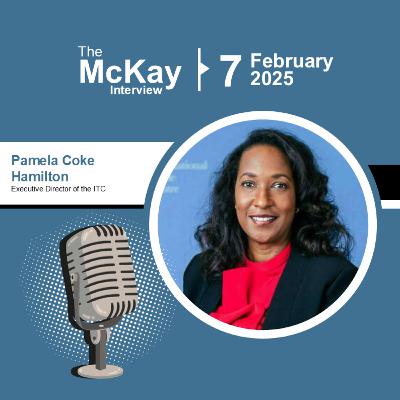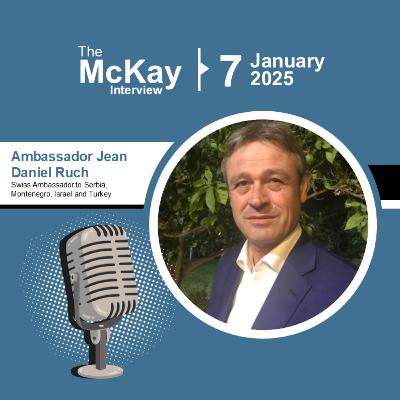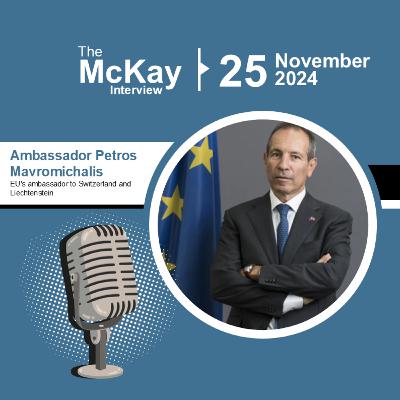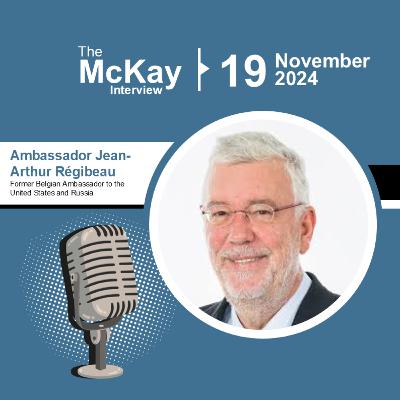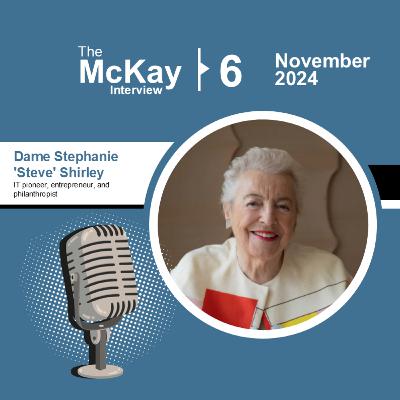Discover The McKay Interview
The McKay Interview

The McKay Interview
Author: Michael McKay
Subscribed: 3Played: 151Subscribe
Share
© 155642
Description
Michael McKay conducts in depth interviews with decision makers and local leaders.
The McKay Interview was founded on a simple idea: that listeners would tune in regularly to listen to intelligent yet relaxed, English-language conversation between Michael McKay and interesting people who do interesting things.
A variety of prominent and thoughtful people have accepted the invitation and a wide range of topics have been covered.
The McKay Interview was founded on a simple idea: that listeners would tune in regularly to listen to intelligent yet relaxed, English-language conversation between Michael McKay and interesting people who do interesting things.
A variety of prominent and thoughtful people have accepted the invitation and a wide range of topics have been covered.
142 Episodes
Reverse
General Sir Gordon Messenger, Trustee of the King’s Foundation and former Vice Chief of the Defence Staff, joins the programme from Geneva to discuss the intersection of military leadership, sustainable development, and royal vision.Established by King Charles III in 1990, the King’s Foundation is distinct from the King’s Trust, focusing not just on youth but on the philosophy of "harmony"—working with the grain of nature rather than imposing upon it. General Messenger explains how this philosophy translates into practical action, from heritage craft training to urban regeneration.Key discussion points include:The Philosophy of Harmony: King Charles III’s vision of integrating human activity with the natural world.Redefining Sustainability: Why true sustainability goes beyond carbon targets to include heritage, craftsmanship, and community "placemaking."The Economics of Quality: The argument against short-termism and why quality construction (like Poundbury) is more economically viable than "cheap and cheerful."Leadership Lessons: Insights from a distinguished military career on authenticity, building teams around a common purpose, and maintaining judgment during crises.The Next Generation: Why General Messenger remains optimistic about the values and environmental commitment of today’s youth.Impressions of the King: A personal look at King Charles III’s authenticity, lack of airs, and deep commitment to his causes.Global Impact: How the Foundation’s model at Dumfries House is inspiring projects internationally, including in Australia.This episode offers a fascinating look at how traditional values and skills are being revitalized to address modern challenges, guided by experienced leadership.
Hurricane Melissa, a Category 5 storm with winds reaching nearly 300 km/h, recently devastated Jamaica, leaving over 600,000 people displaced and wiping out nearly 30% of the country’s GDP. In this episode of The McKay Interview, Jamaican Ambassador Dr. Richard Brown outlines the full scale of the destruction and the urgent need for stronger global support — particularly from international organisations and the United Nations system.Michael McKay and Dr. Brown explore:The unprecedented scale of Hurricane Melissa’s destruction across Jamaica’s western parishesThe economic toll: $6–7 billion in damages and over 120,000 structures affectedWhat worked — and didn’t — in Jamaica’s disaster preparedness and responseHow catastrophe bonds and parametric insurance are helping fund emergency reliefWhy small island developing states like Jamaica need tailored climate finance and legal recognitionThe role of Geneva-based organisations and how donors can support Jamaica’s recoveryThis conversation also delves into larger questions:Is the international system, including the United Nations, still fit for purpose?Can small countries weather climate shocks without systemic global reform?And what does Jamaica’s resilience — “Wi likkle but wi tallawah” — look like in 2025?Listen now to better understand the link between diplomacy, climate justice, and international solidarity.
Michael Møller, former United Nations Under Secretary-General and Director-General of the UN Office at Geneva, returns to The McKay Interview for a hard-hitting, wide-ranging discussion. With over four decades of service across five continents, Møller offers deep insight into the challenges facing multilateralism — and the urgent reforms the United Nations must now confront.We discuss:The fragmentation of geopolitics and the fading taboo against the use of forceHow technology is reshaping international diplomacy — and exposing systemic weaknessesUN reform: why “UN 2.0” proposals may be too little, too lateWhy budget cuts are not just administrative — they’re existentialThe growing disconnect between the political UN and the operational UNCities, regions, and businesses: the new multilateral actors stepping upThe US and China: the funding gap that’s quietly paralyzing international cooperationThe future of International Geneva – and whether it's being eclipsed by other global hubsWhat kind of leadership the UN — and the world — really needsReflections on Gaza, Trump, peacekeeping, and the limits of diplomacyMøller is frank, thoughtful, and unflinching. This is a timely episode for anyone concerned with the future of the international system and the role of the UN in a deeply divided world.
We speak with Professor Emerita Victoria Curzon Price of the University of Geneva, economics department, a leading thinker in international economics and an old friend of the programme. Together, we unpack the shifting global trade landscape, the resurgence of tariffs, and what it all means for Switzerland and the wider world.We discuss:Why the United States is using tariffs as a strategic tool and whether Trump’s approach contains “a grain of truth.”The benefits and risks of tariffs for both exporters and domestic consumers.How Switzerland has been caught in the crossfire of recent U.S. trade policies and what options it has.The weakening of the World Trade Organization and the consequences for international law and global commerce.The lessons of history – from mercantilism to the Marshall Plan – for today’s trade tensions.Professor Curzon Price’s clear-eyed analysis brings historical depth and sharp insights to one of the most pressing economic issues of our time.
Doreen Bogdan-Martin, Secretary-General of the International Telecommunication Union (ITU), leads one of the world’s most powerful yet least-known organizations from her base in Geneva. The ITU is responsible for everything from managing global radio frequencies and satellite orbits to bringing 2.6 billion people online and shaping the digital future.This conversation goes far beyond acronyms and infrastructure. It’s about power, inequality, space governance, and the foundational role connectivity plays in modern life.Key topics include:The cost of connecting the unconnected: why $1.6 trillion is needed by 2030How the ITU governs satellite orbits and global radio spectrumThe geopolitical tug-of-war behind technical standards and spectrum accessWhy AI cannot serve humanity until the digital divide is closedPartnerships with the private sector and governments across 194 member statesEarly-warning systems, disaster risk reduction, and space sustainabilityHow Geneva’s ecosystem of international organizations enables global cooperationThe future of the ITU in a time of budget pressure and rising nationalismFrom space debris to digital literacy, this episode explores the invisible infrastructure behind everything from your smartphone to international security.
Michael McKay sits down with the Right Honourable Helen Clark—former Prime Minister of New Zealand and former head of the United Nations Development Programme—for a wide-ranging conversation on democracy, multilateralism, women in leadership, and global governance.Helen Clark is widely regarded as a modern-day stateswoman, with decades of experience in public service, diplomacy, and international development. As Prime Minister of New Zealand from 1999 to 2008, and later as Administrator of the UNDP, she has worked at the intersection of national politics and global cooperation.Together, McKay and Clark explore:Why 2024–25 marks a critical juncture for democracy, with elections in over 60 countries.The rise of populism and political polarisation—and how institutions can weather the storm.New Zealand’s regional role in the Asia-Pacific and its unique diplomatic stance.Lessons from leading in a multicultural, treaty-based democracy.The challenge of engaging younger generations in politics and civic responsibility.Gender and leadership: How women lead differently—and why it matters.The role of international organisations like the UN, Chatham House, and the Global Leadership Foundation in rebuilding trust and dialogue.The future of global governance in the face of wars, climate change, and crumbling consensus.This episode is a rich, insightful reflection on leadership, values, and the uncertain path ahead for democratic societies.
Michael reconnects with veteran BBC Vatican correspondent David Willey OBE for a compelling conversation on the end of Pope Francis’ papacy and the early days of his successor, Pope Leo.Drawing on over four decades of covering the Holy See, Willey offers a unique insider's view on the Church’s evolving leadership, the challenges it faces in a rapidly changing world, and the significance of a new, polyglot pope at the helm.The discussion covers:Pope Francis’ legacy: his personal simplicity, reform efforts, and the limits of his pontificate.The unresolved crises of Vatican finances and clerical abuse scandals.The early signals from Pope Leo: his American background, his cautious leadership, and his surprising love of tennis.The future of priestly celibacy, the role of women, and the Vatican’s stance on LGBTQ+ issues.Catholic relations with China, Islam, and Evangelical Christianity.Whether the Vatican can still be a force for global diplomacy in conflicts such as Ukraine.The shifting centre of gravity in the Church—from Europe to the Global South.This interview offers an unflinching yet hopeful look at where the Catholic Church stands today—and where it may be heading tomorrow.
Michael McKay sits down with Professor Marcel Salathé, joint director of the EPFL AI Center in Lausanne, to explore the rapidly evolving world of artificial intelligence—and what it means for us all.Professor Salathé offers a rare combination of technical insight and clear communication, making this episode essential listening for specialists and non-specialists alike. From the ethics of AI warfare to the optimism of medical innovation, this wide-ranging conversation covers the most urgent topics at the intersection of technology, society, and geopolitics.Together, they discuss:The speed of AI development—and whether society and policymakers can keep upAI as the new automation: what’s at risk, what’s gained, and what will changeWhy general and superintelligent AI raise concerns about control and safetyThe dual-use nature of AI in medicine and military strategyGeopolitics and AI: the CHIPS Act, US-China dynamics, and Switzerland’s positioningRobotics, education, and what Swiss precision can bring to the future of AIHow to prepare the next generation without fear or overexposureWhy Marcel believes Switzerland may be uniquely poised for the age of roboticsReflections on science communication, student potential, and personal fulfilmentAn informed and forward-looking conversation about one of the most important forces shaping our future.
Michael McKay speaks with Dr. Brian Costello, Medical Director of Mayo Clinic Global Consulting and Professor of Oncology and Urology, and Professor Jacques Bernier, Swiss Medical Network’s Chief Science Officer and Specialist in Radio-Oncology and Nuclear Medicine.They discuss the newly launched collaboration between Mayo Clinic and Swiss Medical Network, announced at the Genolier Innovation Hub near Geneva. This in-depth conversation covers:The origin and ethos of Mayo Clinic’s patient-first approachWhy Swiss Medical Network was chosen as a partner for Mayo’s global care networkShared values, due diligence, and trust in establishing a cross-border medical allianceKey areas of cooperation: executive health, ophthalmology, and nursing educationHow integrated care models in Switzerland aim to reduce healthcare costsThe challenge of maintaining quality amid rising costs and complex insurance systemsEmerging medical priorities: neuroscience, early cancer detection, and AI in healthcareInsights on healthcare equity and outcomes in the U.S. and SwitzerlandWhat each guest has learned from this transatlantic partnershipAn insightful episode on the future of medicine, collaboration across borders, and how the needs of the patient must remain at the center of healthcare systems.
In this episode of The McKay Interview, host Michael McKay sits down with Frédéric Lelièvre, CEO and Editor-in-Chief of L’Agefi, the leading financial newspaper in French-speaking Switzerland. Speaking from Lausanne, they explore the evolving landscape of Swiss banking — from overregulation to global competitiveness, from Credit Suisse's collapse to Donald Trump’s tariffs.Drawing on Frédéric’s decades of financial journalism, the conversation tackles key issues including:The fall of Credit Suisse: mismanagement, weak oversight, and missed signalsCan we still trust Swiss banks — or is overregulation part of the problem?Basel III: what it means, why it matters, and whether Switzerland is too compliantThe Swiss National Bank's performance: monetary stability vs. crisis responseNeutrality and sanctions: how the Ukraine war shook Switzerland’s financial identityThe risks of deglobalization and Trump-era tariffs for small, export-driven economiesThe future of Switzerland as a global wealth management hub: what’s at stake?This thoughtful and richly detailed interview is essential listening for anyone interested in Swiss finance, global economics, and how national banking systems are navigating a new era of uncertainty and geopolitical tension.
In this wide-ranging and thoughtful conversation, Sir Richard Dearlove — former Chief of the British Secret Intelligence Service (MI6) — joins The McKay Interview to reflect on geopolitics, national security, technology, and leadership in today’s uncertain world.Now Chairman of the Board of Trustees at the University of London, and formerly Master of Pembroke College, Cambridge, Sir Richard draws from decades of public service to offer a grounded perspective on the threats and challenges shaping our era.We cover:Reflections on his time in Geneva and the end of the Cold WarHow pandemics, populism, and Pax Americana have reshaped the global orderThe enduring role of state intelligence and the evolving nature of espionageWhy AI and social media pose unique threats — and opportunities — for truthThe “big man” theory of leadership: personality vs. system in shaping world affairsHow to prepare future leaders and the case for national serviceThe real world of MI6 vs. the myth of James BondThoughtful, candid, and seasoned with wit, Sir Richard gives us not only a rare insider’s view into the world of intelligence but also a philosophical take on what holds societies together — and what might tear them apart.
In this third appearance on The McKay Interview, retired Lieutenant General Ben Hodges returns with hard truths and strategic insight into the war in Ukraine and its global implications. Speaking from Frankfurt, the former Commander of U.S. Army Europe reflects on what’s changed — and what hasn’t — in the 15 months since his last visit.We cover:The state of the battlefield in Ukraine: territory, logistics, morale, and momentumRussia’s failure to gain air superiority, and why that mattersDrones and modern warfare: how unmanned systems are rewriting battlefield tacticsUkraine’s evolving defense structure: manpower, training, and industrial baseA sharp critique of U.S. and German leadership — and what it means for NATOWhat it would take for a ceasefire or peace negotiation to be credibleWhy Europe must rediscover its strategic self-confidenceThe best- and worst-case outcomes for the region — and the worldWith his trademark clarity and candor, General Hodges helps us make sense of a conflict that continues to shape the 21st century.
In this episode of The McKay Interview, Michael McKay sits down with Jeremy Lack, a Geneva-based independent lawyer and one of Switzerland’s leading experts in dispute resolution. Trained as a barrister in England and admitted to the bars of New York, Geneva, and England and Wales, Jeremy has built a unique international career at the intersection of law, neuroscience, and cross-cultural conflict resolution.Jeremy reveals how he pivoted from high-stakes intellectual property litigation to become a pioneer in mediation and appropriate dispute resolution (ADR). Drawing from over 400 mediations worldwide, he explains why classic adversarial legal systems are often ill-equipped to resolve today’s complex disputes—whether in business, families, or international diplomacy.What mediation actually is—and why it works when negotiation failsThe seven factors of effective dispute resolution: cost, time, relationships, process, outcome, confidentiality, and enforceabilitySurprising insights from neuroscience about how conflict changes the human brainHow shared meals, common ground, and third-party facilitation can rehumanize adversaries—even in high-level conflictsReal-world examples from boardrooms, biotech firms, and even state-level diplomacyWhy Geneva—and Switzerland more broadly—offers one of the most forward-thinking frameworks for managing disputesWhether you’re a business leader, policymaker, lawyer, or someone simply looking to better understand human conflict, this episode offers powerful tools and eye-opening perspectives.
In this episode of The McKay Interview, we discover the Genolier Innovation Hub, Switzerland’s groundbreaking medical and biotech innovation center. Located in the French-speaking canton of Vaud, the Hub is revolutionizing how medical advancements move from research labs to real-world patient care.Joining Michael are Antoine Hubert, Founder and Chairman of the Board, and Anna Gräbner, CEO of the Genolier Innovation Hub, who share insights into the Hub’s unique integration of healthcare, research, and industry collaboration.In this thought-provoking discussion, we explore:The difference between invention and innovation in medical scienceHow the Hub’s direct connection to a working clinic accelerates medical advancementsSwitzerland’s role as a global leader in medical research and biotech investmentThe balance of public-private partnerships in Swiss healthcareWhy this facility is open to the public and how visitors can experience medical innovation firsthandWith cutting-edge facilities, leading industry partnerships, and a vision for the future of precision medicine and patient-centered care, the Genolier Innovation Hub is a model for healthcare innovation.
In this episode of The McKay Interview, Michael McKay speaks with Pamela Coke-Hamilton, Executive Director of the International Trade Centre (ITC), for an in-depth discussion on the evolving landscape of global trade and the economic forces shaping our world today.With a career dedicated to international commerce, sustainability, and economic development, Koch Hamilton provides expert insight into the growing challenges and opportunities for businesses, governments, and international organizations navigating today’s turbulent trade environment.In a candid conversation, McKay and Koch Hamilton explore:The impact of tariff wars and economic uncertainty on global tradeHow small businesses and developing economies can adapt to shifting trade policiesThe future of sustainable trade, including green initiatives and ethical supply chainsThe evolving role of regional trade agreements and economic blocsHow businesses and nations can navigate the changing international trade systemWith trade wars escalating, global economic policies shifting, and sustainability becoming a key driver of commerce, this episode offers an essential perspective on the future of international trade.
In this episode, Jean Daniel Ruch, a recently retired Swiss ambassador, joined us on the 7th January 2025, for an insightful discussion on diplomacy, neutrality, and global geopolitics.With a distinguished career spanning multiple high-stakes postings—including Serbia and Montenegro, Israel, and Turkey—Ruch brings a wealth of firsthand experience from some of the world’s most complex regions. From his time advising on the Yugoslavia war crimes tribunal to serving as Switzerland’s special envoy for the Middle East, he shares unique perspectives on international conflict resolution and Switzerland’s evolving diplomatic stance.In a candid conversation, McKay and Ruch explore:Switzerland’s neutrality and how it has been challenged in recent years, particularly with its stance on sanctions against Russia.The global power triangle between Washington, Beijing, and Moscow, and its implications for European stability.The Middle East crisis, the future of Israel-Palestine relations, and the role of Turkey in regional geopolitics.How trust can be rebuilt in post-war zones and the potential future of Syria after the collapse of the Assad regime.Jean-Daniel Ruch’s frank and informed analysis offers a rare glimpse into the realities of modern diplomacy, international law, and Switzerland’s position on the world stage.
Switzerland is often described as the "hole in the EU doughnut", a country deeply intertwined with the European economy but not a member of the European Union. Today, I sit down, on January 12, 2025, with Ambassador Petros Mavromichalis, the EU’s Ambassador to Switzerland and Liechtenstein, to discuss the complexities of this relationship.We cover:Switzerland’s EU Negotiations: Why Switzerland prefers bilateral agreements over full membership and the challenges in aligning with evolving EU laws.The Sticking Points: How free movement of people, labor market access, and dispute resolution mechanisms have become major hurdles.The EU’s Economic Outlook: Can Europe compete with a growing US economy, and where does the EU see untapped potential?Migration and Border Challenges: How the EU is handling legal migration, the aging workforce, and the challenge of illegal migration across its vast borders.Climate Change and EU Leadership: The EU’s ambitious Net Zero by 2050 goal, financial commitments to developing nations, and the challenge of balancing economic realities with climate action.Join us for a deep dive into Switzerland’s unique position in Europe, the EU’s broader strategic goals, and how both sides navigate their interdependent but often tense relationship.
Just two weeks after Donald Trump’s victory over Kamala Harris, on the 19th November 2024, I sit down with Ambassador Jean-Arthur Regibeau, Belgium’s recently retired ambassador to the U.S. and Russia, to discuss the complex relationship between America, Russia, and Europe.We cover:The U.S. Election Outcome: Why Trump’s landslide victory was both expected and surprising.Why the Democrats Lost: Did they lose touch with ordinary Americans?What Americans Want from Politicians: The growing divide between the elite and the working class.Russia’s Political Reality: Is Putin truly in control, and how has Russia changed since the invasion of Ukraine?The Future of Ukraine: Will the war end in an armistice or victory?Europe’s Security Concerns: Can Europe stand on its own if the U.S. shifts focus to the Pacific?NATO’s Changing Role: What does an expanded NATO mean for Europe’s defense?Cultural Clashes: Woke politics, gun control, and what Europeans misunderstand about America.Bridging the Divide: The role of curiosity and open dialogue in fostering mutual understanding.Join us for an insightful discussion on global politics and the shifting dynamics between these three powerful regions.
In this episode, I sit down with Alexandre Fasel, Switzerland’s State Secretary for Foreign Affairs, at the Federal Palace in Bern on 25th November 2024. With the world in flux, we discuss Switzerland’s evolving role in global diplomacy, security, and multilateralism.We explore:The war in Ukraine and European security: How Switzerland is engaging diplomatically amid rising geopolitical tensions.Swiss neutrality and sanctions on Russia: Addressing concerns over Switzerland’s position as an "honest broker" while enforcing EU sanctions.Switzerland and the EU: The latest on negotiations and Switzerland’s strategic relationship with its largest trading partner.Switzerland’s global role and soft power: From Geneva’s role as a center of global governance to innovation and scientific diplomacy.Swiss defense exports and neutrality: The complexities of arms exports and Switzerland’s War Material Act.The impact of the US elections: What a Trump victory could mean for Swiss-American relations.Join us for an in-depth discussion on how Switzerland navigates an increasingly complex world while upholding its principles of diplomacy, neutrality, and international cooperation.
In this episode, I sit down once again with Dame Stephanie Shirley, the remarkable IT pioneer, entrepreneur, and philanthropist, whose extraordinary life journey—from a Kindertransport refugee to one of Britain’s most influential businesswomen—has inspired many.We discuss:From war refugee to tech trailblazer: How Dame Steve arrived in the UK as a child and went on to build a pioneering software company.Breaking barriers for women in business: The challenges she faced as a female entrepreneur in the 1960s and how she helped reshape the tech industry.The power of philanthropy: Her motivations for giving away over £70 million and how her approach mirrors the rigor of business strategy.The impact of giving: Stories of lives transformed, including her focus on autism research and technology for social good.Lessons for young people: Her advice on living a meaningful life, pursuing ambition, and surrounding oneself with the right people.Reflections on restlessness and legacy: Why, even in her 90s, she continues to push forward with new projects, including a potential TV series about her life.Join us for an inspiring conversation with a woman who has not only changed industries but also dedicated her life to making the world a better place.


